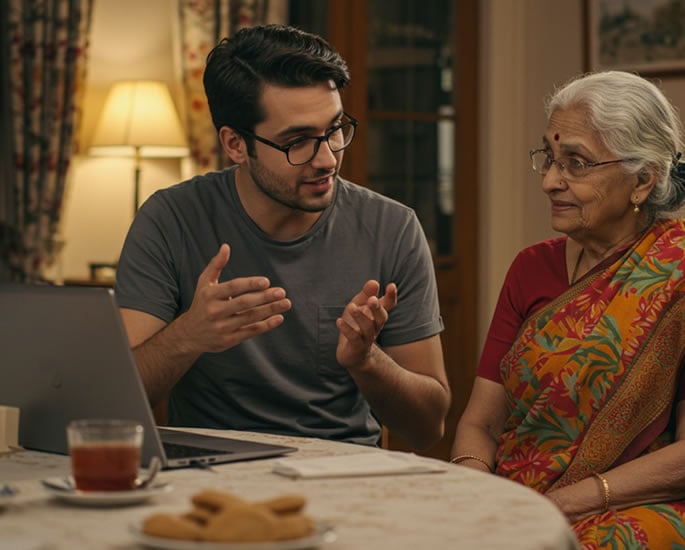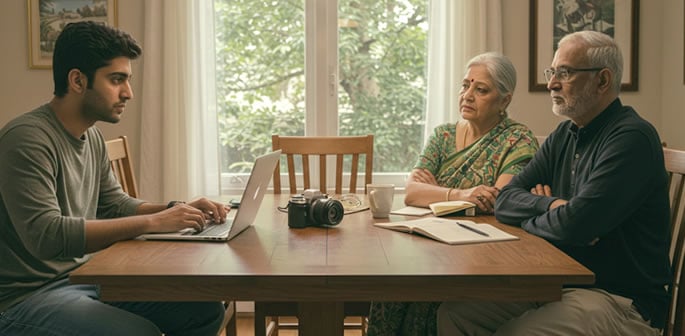That’s where the obsession with “safe” careers comes from.
Doctor. Lawyer. Engineer. For many South Asian parents, these careers were the holy grail.
They represented everything that a secure life in Britain could offer. It’s no surprise that families held them up as gold standards.
But that old script is starting to fray.
Today’s generation is quietly rewriting the definition of success.
They want more than job security and social status; they want purpose, fulfilment, and autonomy.
From illustration and content creation to fashion and marketing, British Asians are choosing paths that would have once raised eyebrows at the dinner table. And they’re doing so with clarity, not rebellion.
It’s not just a clash of jobs. It’s a clash of values: safety versus self-expression. And the fallout? It plays out at home, one awkward conversation at a time.
Understanding the Pressure

To understand the pushback, you have to look at what our parents went through.
Many of them arrived in Britain with little more than determination. They sacrificed comfort and familiarity in pursuit of stability for themselves, but more importantly, for their children.
That’s where the obsession with “safe” careers comes from.
They weren’t trying to stifle creativity; they were trying to guarantee survival.
In their world, a title meant protection. A doctor’s salary couldn’t be outsourced. An engineer’s job came with benefits and status.
That linear path of degree, job, and house offered something they never had: predictability.
Add in the pressure of the community, and it’s easy to see why anything outside that box was frowned upon. “Log kya kahenge?” (What will people say?) is more than a phrase. It’s a generational watchdog.
London-based illustrator Kiran* recalls:
“It took years for my parents to stop asking when I would get a ‘real job’.”
Her comment cuts to the heart of the matter: even creative success is often dismissed as temporary or unserious.
But for this generation, a “real job” looks different.
A New Kind of Ambition

Younger British Asians are chasing careers fuelled by passion, not just pay. They care about mental health, work-life balance, and making an impact.
The goal is to do work that feels meaningful. And crucially, the tools have changed.
Social media has democratised creative work. Platforms like TikTok, Instagram, and YouTube allow people to build audiences and monetise content on their terms. The gatekeepers are gone.
Tattoo artist Rameez says: “This generation has seen people make a living doing what they love.
“When I started, my dad thought it was a joke. But now, clients come from all over the UK, and he brags about me to the neighbours.”
There’s a deep sense of purpose driving this shift. It’s not about chasing fame; it’s about building something authentic.
Nafisa Bakkar, co-founder of Amaliah, saw a gap in the market and filled it with a platform spotlighting Muslim women’s voices. That kind of vision isn’t easy to ignore, even for sceptical parents.
But still, the gap between generations remains.
One side asks about pensions. The other side is measuring success through reach, impact, or creative fulfilment.
For Anika*, a video game writer, that tension is ever-present:
“My mum still thinks I’m ‘just playing games all day’.
“But I’m writing characters that represent us; brown girls who aren’t just stereotypes. That’s what keeps me going.”
‘The Conversation’

The hard part is telling your parents and it is rarely just one conversation. It’s a series of negotiations, setbacks, and rehearsed monologues. But it always starts with the same thing: a plan.
Don’t just say you’re quitting your graduate scheme to be a content creator.
Show them your business model. Bring data, milestones, and examples of others doing it well. Talk about monetisation, strategy, and contingency plans. Speak in the language they understand.
Frame your dream like a business pitch. A freelance photographer? Call it a visual branding studio. An artist? A creative entrepreneur with a multi-channel distribution model.
It’s not about deception; it’s about bridging the vocabulary gap.
Zain, who quit his accounting career to open a food truck, said the preparation was key:
“I put together a budget, forecasts, and testimonials. My dad still didn’t get it but he respected the hustle.”
Your tone matters too. Be calm, not defensive.
Acknowledge their fears: “I know you’re worried about money. That matters to me too.” Then steer it back to your plan. You’re not dismissing their struggle, you’re applying the same work ethic to a different path.
Earning Trust

Convincing them takes time. It’s not one breakthrough, it’s small victories, repeated until they stick.
The first paid gig. The first rent cheque. The first press feature.
These moments, however small, start shifting their perspective. It’s no longer just a pipe dream, they’re seeing results.
Even better if someone they trust validates your work. An uncle praising your coding skills? That can carry more weight than a YouTube analytics breakdown. External approval matters, sometimes more than your own explanations.
Keep your parents in the loop. Share wins. Let them see the process.
They may never fully understand, but they’ll feel more connected and more assured.
For Devina, a costume designer working in TV and theatre, this consistency paid off:
“At first, my dad used to say, ‘When will you get a steady job?’ Now he asks, ‘What show are you on next?’ That’s progress.”
Living the Reality

Acceptance doesn’t mean total understanding. You’ll still get awkward questions. “So… what do you actually do?” “Is this a long-term thing?”
But over time, those questions soften. Curiosity replaces criticism.
They might even start learning your world. Asking about your latest project, your follower count, or your brand collab.
It’s their way of trying. And in some cases, it becomes respect.
You also become the go-to expert in the family. Need a logo? Ask the cousin. Want a website? Get your daughter to do it.
That kind of validation, though informal, often means more than a lecture hall full of applause.
Fashion stylist Hasan says: “It’s mad. I used to get eye rolls. Now my mum asks me to pick her Eid outfits.
“They’re not saying sorry, but that’s their way of saying: ‘We see you’.”
Paving the Way for Others

By stepping off the beaten path, this generation of British Asians is doing more than choosing non-traditional careers; they’re shifting what’s possible.
Younger siblings and cousins are watching and their conversations with parents are a little easier because of the groundwork you laid.
There’s a legacy in that, not just for the individual, but for the community.
Priya*, a social media executive, says: “It’s not about being the rebel.
“It’s about being the first. Once they see you’re okay, better than okay, they stop worrying and start believing.”
This slow shift is an expansion of tradition. It’s a new Desi dream, one where stability and self-fulfilment coexist.
At its core, this story isn’t about careers; it’s about evolution.
What we’re seeing is a new chapter in the British Asian journey.
A generation that respects the past but won’t be bound by it. A generation that sees its parents’ sacrifice, honours them and builds something of its own from it.
It’s not about choosing between family and freedom. It’s about bringing them closer. Showing that happiness, purpose, and even financial success can look different and that’s okay.
Because when they see you thriving, they stop asking what you’re doing and start asking how they can support it. And that’s when you know the narrative is changing.






























































